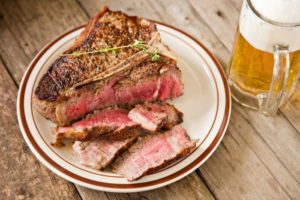 Gout is a type of arthritis that is caused by an excess of a waste product called uric acid in the blood. When there is too much uric acid, crystals can form in the joints, causing severe pain, tenderness, redness, and inflammation.
Gout is a type of arthritis that is caused by an excess of a waste product called uric acid in the blood. When there is too much uric acid, crystals can form in the joints, causing severe pain, tenderness, redness, and inflammation.
Gout most commonly affects men. However, it can also affect women who have been through menopause. A gout episode or “attack” can come on suddenly, especially at night. Attacks can last for anything from a day to 10 days.
Certain medications can be used as treatment to relieve symptoms and reduce uric acid levels. Another form of treatment is to make changes to diet to help prevent further attacks.
Contents of this article:
How might diet affect gout?
Sample menu
Outlook
How might diet affect gout?
Studies have shown that consuming certain types of food can bring on a gout attack. Substances known as purines are present in animal and plant foods and turned into uric acid in the body.
Steak and beer
Certain food and drink such as alcohol and red meat can bring on a gout attack.
Foods high in purines – although not purine-rich vegetables – increase the risk of a person developing gout. Reducing intake of these foods will help prevent it.
The following foods should be avoided:
Alcohol, especially beer and hard liquor
Red meat and organ meat such as liver or kidneys, which are high in saturated fat
Seafood such as lobster, shrimp, sardines, anchovies, tuna, trout, mackerel, and haddock
Sugary drinks and foods high in fructose
Processed foods and refined carbohydrates
Contrary to popular belief, fasting is not effective in preventing gout. Instead, it can actually increase the chances of an attack and should be avoided.
Gout diet
The main goal for people who are affected by gout is to develop lifelong healthful eating habits.
A healthful diet for people with gout should include all the food groups. Foods such as low-fat dairy, vegetables, whole grains, and nuts help reduce the levels of uric acid and are also good for a healthy heart. This is important as studies have shown that gout increases the risk of heart problems developing.
The following food types are recommended:
Water – at least eight glasses per day
Low-fat dairy products – such as yogurt, cottage cheese
Whole grains
Eggs
Some lean meats such as chicken – approximately 2 ounces per day
Some fruits that are low in fructose, – strawberries and cherries, for example
Vegetables – a diet rich in vegetables is good, such as spinach, mushrooms, asparagus, and cauliflower
Vegetable oils such as olive, canola, sunflower
Vitamin C – between 500-1,000 milligrams per day
Coffee
Interestingly, studies have shown that purine-rich vegetables such as pulses, spinach, mushrooms, and cauliflower do not increase the chances of developing gout. Oats also do not increase this risk, which is good news for the heart.
Sample menuBaked potato
A baked potato and salad may be suggested as a healthful lunch.
Breakfast
Small glass of orange juice
Half a cup cereal with low-fat milk or yogurt
Berries
White toast with jelly and 1 teaspoon margarine
Coffee
Glass of water
Lunch
Baked potato with 1 teaspoon margarine
Tossed salad with fat-free salad dressing
1 cup of fruit salad
2 percent milk
Glass of water
Dinner
Half a cup of skinless chicken breast (3 ounces)
Half a cup of rice
Half a cup of broccoli
Half a cup of low-fat frozen yogurt
Glass of water
Outlook
With a healthy, low-purine diet, the outlook for someone with gout is positive. A diet that helps reduce the levels of uric acid in the body is essential and can prevent any damage caused to the joints.
Other lifestyle changes that may help in the management of gout are:
Maintaining a healthy weight. If necessary, losing weight can lower the risk of developing further gout attacks. It will also reduce the chances of developing heart problems.
Exercising. As well as the obvious benefits, engaging in physical activity is an important part of maintaining a healthy weight
person walking in a forest
Lifestyle changes such as eating more healthful foods and exercising may help to manage gout.
Attacks of gout are most painful during the first 24 hours. Gout generally affects the big toe, and even the weight of a blanket can feel unbearable. If it is left untreated, gout can spread to other joints in the body, in both the upper and lower limbs.
Other treatments for gout include the following:
Anti-inflammatories (NSAIDs), colchicine, and steroid medication to give immediate relief to the symptoms during an attack
Certain medications such as allopurinol to reduce the levels of uric acid in the body
MNT DT






